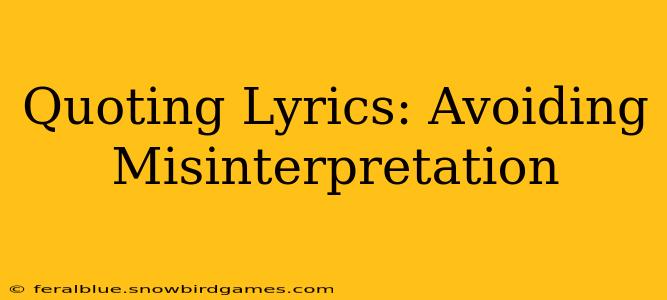Quoting song lyrics can be a powerful way to add emphasis, illustrate a point, or simply share a moment of musical appreciation. However, the nuances of language, the context of the song, and the potential for misinterpretation all demand careful consideration. Pulling a line out of its context can drastically alter its meaning, leading to inaccurate or even misleading interpretations. This guide will help you navigate the complexities of quoting lyrics responsibly and accurately.
Why is Accurate Lyric Quoting Important?
The importance of accurate lyric quoting extends beyond simple correctness. Misquoting lyrics can:
- Distort the artist's intended meaning: Lyrics are often carefully crafted, with word choices and phrasing contributing to the overall message. Taking a line out of context can completely change the intended meaning, misrepresenting the artist's vision.
- Lead to misinterpretations by your audience: If your quote is inaccurate, your audience may draw incorrect conclusions, potentially leading to misunderstandings or even offense.
- Damage your credibility: Consistently misquoting lyrics undermines your trustworthiness and expertise. Attention to detail in quoting shows respect for the art form and the artist.
How to Quote Lyrics Accurately
Here’s a step-by-step guide to ensure you quote lyrics correctly and avoid misinterpretation:
-
Verify the Lyrics: Don't rely on memory! Always consult a reliable source like official lyric websites (many artists have official sites), reputable lyric databases (like Genius), or the song's liner notes. Multiple sources are even better for cross-referencing.
-
Consider the Context: A single line rarely tells the entire story. Analyze the surrounding lyrics, the overall theme of the song, and the album it's from to understand the line's intended meaning within the larger context. Often, the verse or even the entire song is necessary to grasp the true intention.
-
Use Correct Punctuation and Formatting: Maintain the original punctuation, capitalization, and line breaks whenever possible. If you need to adjust for grammatical flow within your own writing, clearly indicate the changes using brackets [ ] or ellipses … to show omissions or alterations.
-
Attribute the Lyrics: Always credit the artist and the song title. This is crucial for ethical reasons and avoids plagiarism. For example: "As Bob Dylan famously sang in 'Blowin' in the Wind,' 'The answer, my friend, is blowin' in the wind.'"
-
Avoid Selective Quoting: Be mindful of taking lines out of context to support a specific argument. While you can focus on specific lines, always ensure the overall context is clear to prevent misrepresentation.
Common Mistakes to Avoid
- Mishearing Lyrics: Sometimes lyrics can be difficult to understand, leading to mishearing and misquoting. Always double-check your understanding with reliable sources.
- Improper Ellipses: Using ellipses incorrectly can create ambiguity or distort meaning. Use them sparingly and only to indicate clear omissions.
- Misinterpreting Figurative Language: Lyrics often use metaphors, similes, and other figurative language. Make sure you understand the intended meaning before quoting.
How to Handle Different Situations
What if a lyric is unclear or ambiguous?
Acknowledge the ambiguity in your writing. Instead of presenting a definitive interpretation, you can offer multiple possible readings or highlight the uncertainty. For example: “The line ‘…walking on a dream’ could be interpreted in several ways...”
What if I need to shorten a quote?
Use ellipses (...) to indicate omissions. Ensure the shortened quote still accurately reflects the original meaning and context.
What if I'm quoting lyrics in a research paper or academic setting?
Use the same principles as above, but be even more meticulous about accuracy and attribution. Consult your institution's style guide for specific formatting requirements.
By following these guidelines, you can ensure that your use of song lyrics is accurate, respectful, and enhances rather than detracts from your writing. Remember, responsible quoting reflects well on both your writing and your appreciation for the art of songwriting.

